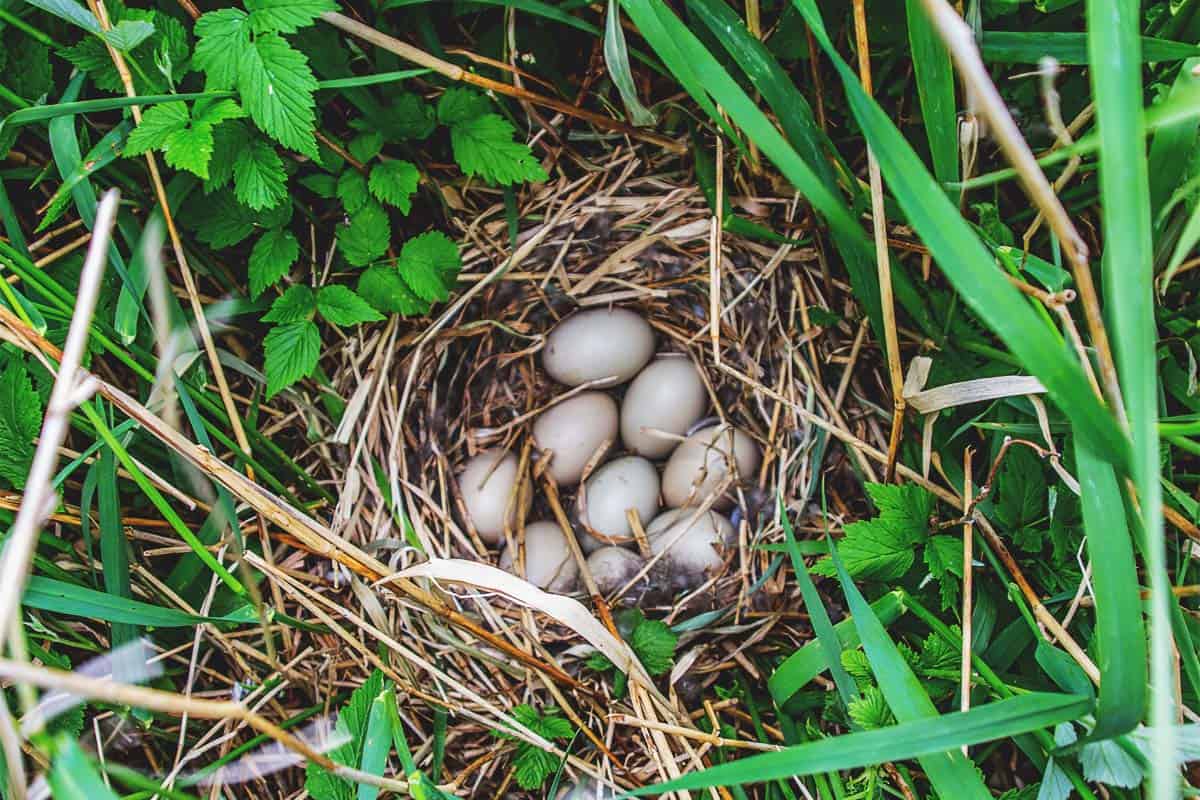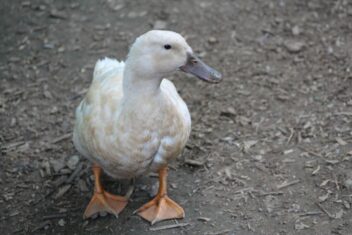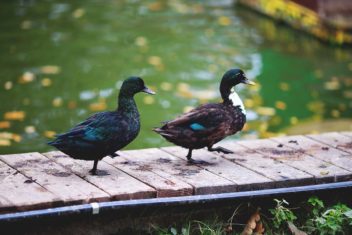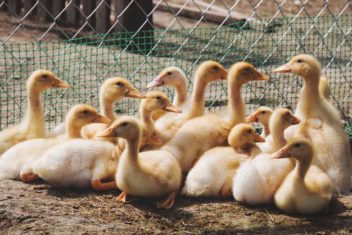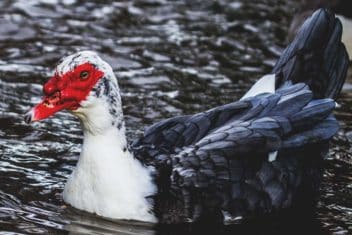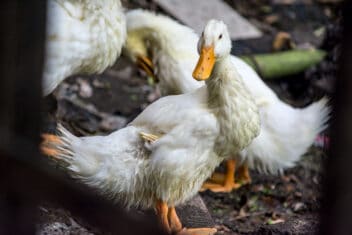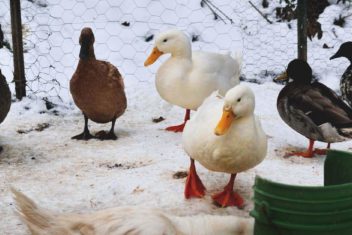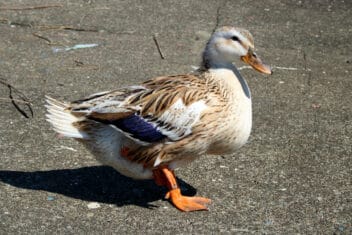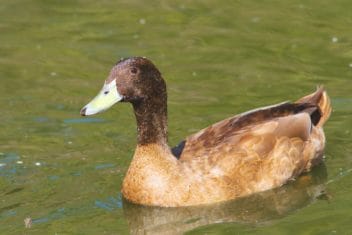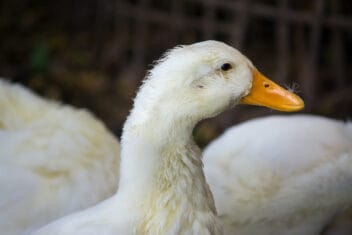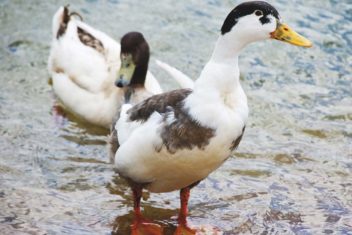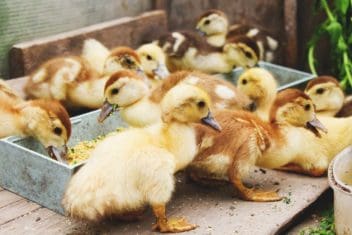There are a lot of similarities between keeping ducks and chickens. They can be kept in similar style coops or shelters with just a few modifications. They can both eat chicken food, as long as you add a few extra things to round out a duck’s needs.
You can even keep ducks and chickens together as long as you give them separate bathing areas. (Ducks bathe in a pond. Chickens bathe in a dust bath.)
But when it comes to nesting habits, here the similarities stop. Other than the fact that they both lay eggs, chickens and ducks have very little in common in natural nesting preferences.
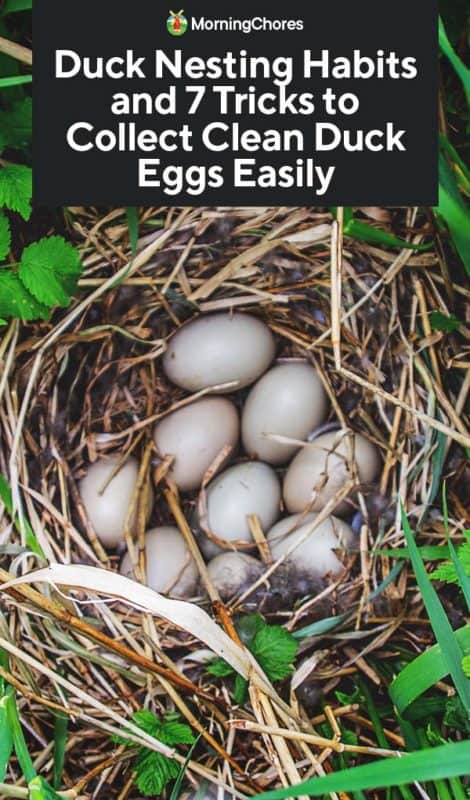
Weird Duck Nesting Habits
Chickens keep their nests tidy. Ducks will turn a tidy nest dirty in a day or two. Chickens like to nest off the ground in a dry location. Ducks like to nest on the ground.
In fact, ducks will even use their bottoms to wiggle round nest depressions into moist soil. If the soil isn’t wet enough to work, they’ll take a swim. Then, they’ll bring water back to the nest area in their feathers to moisten the area.
Also, chickens all love to share the same nest box every single day. Even if you offer them multiple boxes, chickens will take turns laying in the same nest. Ducks, on the other hand, don’t naturally nest in the same location for very long.
1. Ducks are Smart (and Secret) Nesters
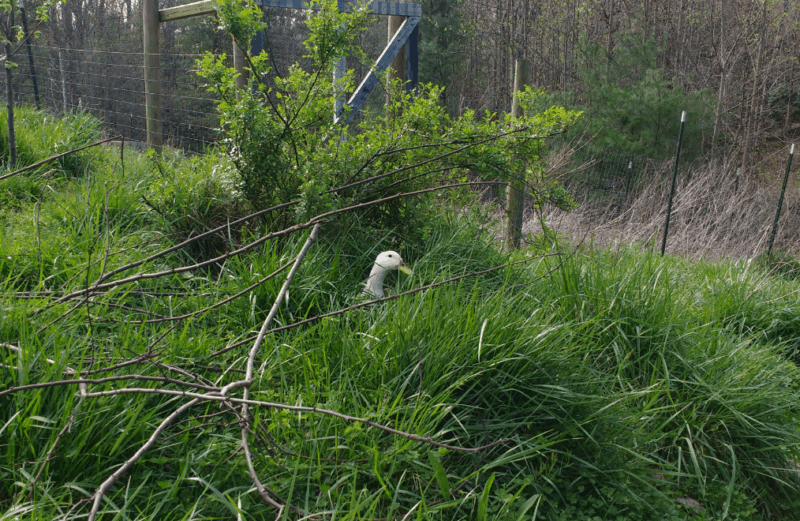
Ducks will lay in one location a few times. However, when their eggs keep getting stolen (hopefully by you), they eventually get smart and go find another secret location to lay in.
2. Ducks Nest in Multiple Locations
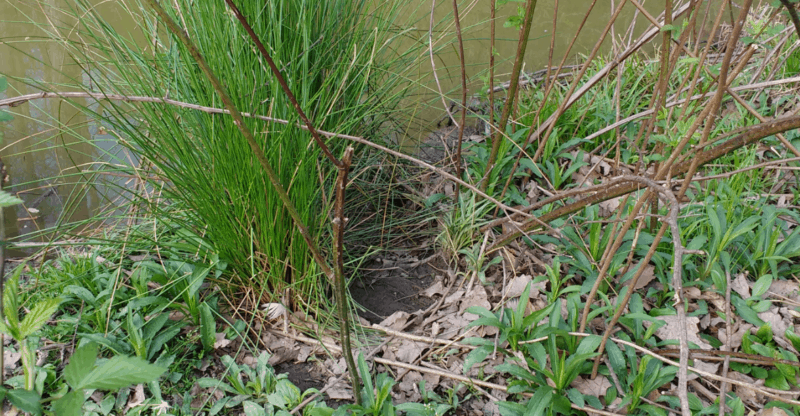
Ducks also often have multiple locations that they share. If you have more than just a few ducks, they set up several nests and take turns laying in them.
So, part of your flock might lay in one nest. Then some of the flock will use the nest around the corner. Finally, a final group might make a new nest and start using that. Ducks really seem to understand the importance of diversifying risks by not putting all their eggs in one ‘basket’ – or nest.
3. Frequent Puzzling Nest Testing
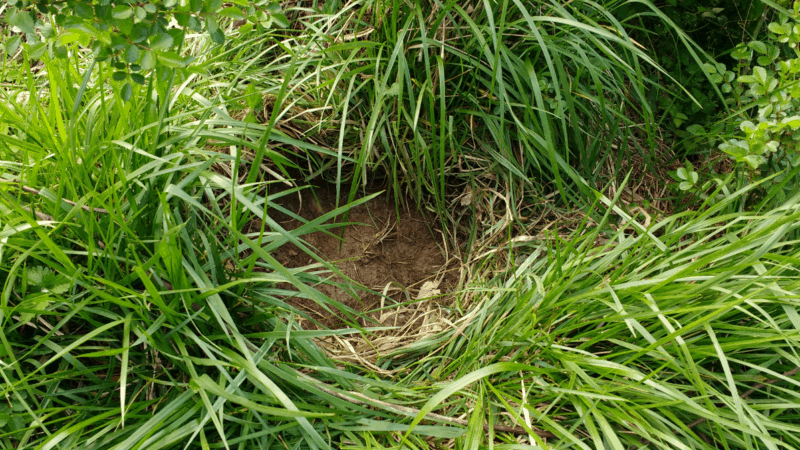
Ducks also have this funny habit of trying nests out before they lay. Many times, I’ve watched my ducks sit on one nest for a few minutes. Then for some mysterious reason, they get up and move to another nest. They may go through 3 to 4 nests before ending up laying in the first one tried.
4. Ducks Create Seasonal Nests
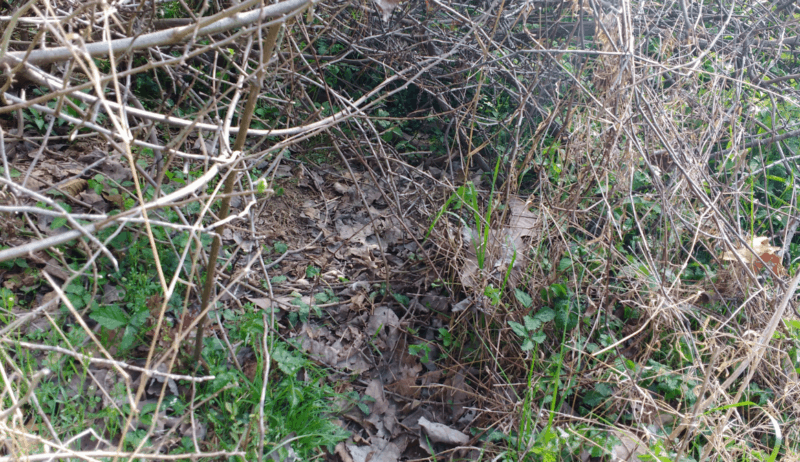
Another thing I’ve noticed is that when ducks stop using a nest, they will hide their nests with debris such as leaves, bark, and even clumps of grass. They may ignore that nest for a few months. But eventually, they come back, clear the debris and put the nest back into circulation.
As best as I can tell, they do this seasonally. It’s as if they have spring nests, summer nests, and fall nests. It’s similar to how some people keep seasonal houses.
5. Duck Dirt on Eggs
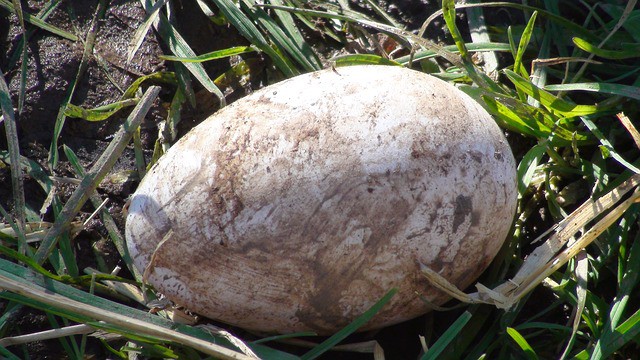
There’s one final thing you need to know about weird duck nesting habits. It’s perhaps the one that is most frustrating to new duck owners. Here it goes.
Ducks dirty their eggs on purpose. Unlike chickens who almost never poop in their nest, ducks will poop in nests. They will even roll their eggs in poop at times.
I don’t know exactly why this is. However, I’ve noticed that it’s more common when the weather is hot or when the nest has multiple users sitting on it for longer times.
I suspect it has something to do with keeping the eggs cool and moist until it’s time to start sitting the nest. It may also be a method of protecting the eggs by masking the smell of a fresh tasty egg with rank duck poop.
The Importance of Observation
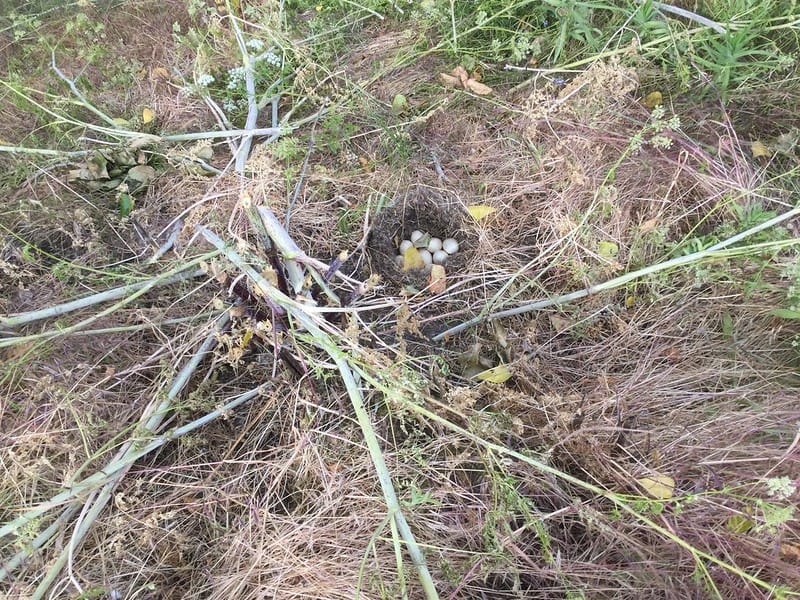
All of those nesting habits are things I’ve observed over the last 6 years of keeping free-range and confined ducks. Being able to pay close attention to these little details and surmise why ducks (or other plants and animals) do what they do is one of the best parts about being a homesteader.
It’s not just about the fun of it, though. Making good observations can help you adapt your conditions to get the right results with your ducks, your other livestock, and in the garden.
I’m about to share some tips that work well for most domesticated ducks and their nesting habits, and will likely work well for yours too. But depending on your environment and the way you keep ducks, you may need to adapt them a little for your duck breeds and conditions.
Here’s why.
Different Environments – Different Results
Ducks, like most animals and plants, are highly sensitive to their environments. So, some of the conditions you create may change their nesting habits. For example, I’ve noticed that free-range ducks lay randomly from pre-dawn up to 9:30 in the morning. Housed ducks seem to lay more consistently between 7:00-9:00 am.
Less Light Dependency
Ducks aren’t completely light dependent for laying eggs as chickens are. In fact, I frequently find my ducks laying before there’s a hint of daylight on the horizon.
They also lay just as much during a rainy week as they do during a sunny week. Meanwhile, heavy cloud cover cuts chicken egg production noticeably. So, it’s more likely that herd mentality triggers simultaneous laying in confined ducks. But, that’s just a guess.
That’s just one example. But it’s important to keep in mind that ducks have different needs depending on the conditions in which they are kept.
The Secrets to Collecting (Mostly) Clean Eggs
Duck nesting and laying habits are fascinating when you start to look closely at them. However, they can make it challenging to collect clean eggs. Thankfully there are a few things you can do to increase your chances of finding and collecting clean, fresh eggs daily.
Trick # 1: Morning Confinement
Ducks, unlike chickens, are morning layers. By about 9:30 each morning, my ducks wrap up their laying for the entire day. By keeping ducks confined until they finish laying, you can ensure that most of their eggs will end up being laid in their nighttime shelter.
Now, I say “most” because ducks that get broody can sometimes hold off on laying until they find their perfect nest. Breeds like the Khaki Campbells, Pekins, and hybrid layers are less likely to do this. But many of the seasonal layers with heritage roots can hold out to lay in a secret location.
Trick #2: Withhold Water
While you have your ducks locked up from dark the night before to 9:30 the next day, withhold their water. This will keep them from making a mess of their house and their nest.
Keep in mind you should absolutely never give ducks their food without water. If you withhold water from your adult ducks, you’ll also need to withhold food. But this is just a good idea anyhow.
Food left in a secure night-time shelter attracts the unwanted attention of scavengers like raccoons and even bears. Those critters don’t usually go after ducks unless they happen to be trapped in a house with other attractive food. So not having food in the shelter is a good predator prevention habit too.
The one exception is that you cannot withhold feed and water from ducklings while they are in the brooder.
Trick #3: Morning Feed
Feed your ducks most of their food in the morning, then let them browse feed the rest of the day. This way they’ll do most of their pooping on your pasture during the day and won’t have much left for their house at night.
Now, some smart ducks do make a point of drinking a lot of water right before bedtime when they know they are going to be locked up. Usually, they have passed this back out before morning laying. As long as your sleeping space and nest areas are separate the before bedtime drink shouldn’t matter.
Trick #4: Keep Cool Nest Areas
One of the reasons that ducks make messes in their nest seems to be to control temperature and humidity. If you situate your nests in cool, humid areas of your duck shelter you can discourage egg dirtying.
The part of the house that gets morning shade works well. Or, you may even want to dig an underground nesting area that is naturally cooled and kept humid by the surrounding soil.
Ducks also love laying in dark areas which is why they often choose heavily shaded locations to lay in nature. Making your nesting areas nearly dark helps keep things cool and makes ducks feel more secure as a bonus.
Trick #5: Use Natural Nesting Materials

Since I free range so many ducks, I get to see their natural preferences for nesting materials. I can tell you they never choose straw or pine shavings when given other options. They like dirt and partially decayed leaves.
– Straw vs. Hay
I sometimes stack hay and straw in my animal shelters. I noticed that the ducks will frequently try to make nests in the hay bales, but never the straw. Hay is a frequent favorite nesting location for my Muscovies.
– Hardwood Mulch
If I had to guess my ducks’ all-time favorite nesting material, it would be double shred hardwood. Whenever I have a pile of it delivered, the ducks start digging in it with their beaks to make nest holes. I can’t tell you how many secret eggs I come across when I start moving that mulch.
Since the ducks love wood mulch and it’s so cheap, it’s become my go-to nesting material for ducks. As an added bonus, it absorbs liquid quickly and makes poop dry faster.
It can get heavy and compacted. Plus, it takes longer to compost. But duck poop and wood mulch, after a year or so of composting, are amazing in a vegetable garden. That makes it worth the heavy lifting for me.
Trick #6: Make Inviting Nest Boxes
Ducks love to nest in places that are almost tunnel-like. That’s why conservation groups often make tunnel nests using chicken wire and straw or leaves to encourage mallards to lay in safe locations.
Domesticated ducks are a bit less picky and will learn to lay in a chicken nest box. But why not make them extra comfortable by giving them a design they prefer? Here are a few to consider.
– The Nest Tube
You can use the mallard nesting tube idea at home. This is especially helpful if you do in fact want your ducks to get broody and incubate eggs.
– The Cozy Tote
Large totes can be used to make the perfect nest. Just cut a duck-sized door and line with natural nesting materials.
– The Fine Wine of Nests

Old whiskey or wine barrels also make charming nest boxes. Some people cut them in half and turn them on their side. This isn’t quite ideal because ducks prefer something with more shade and depth. But full barrels can be hard to collect eggs from.
For full barrels, you can use a fruit picker or trash picker tool to collect eggs. Or cut yourself a door so you can get in the back. You’ll also likely need a rake to clean these out when the nesting materials get sullied.
Less expensive 55-gallon drums are another great option.
Trick #7: Make Your Job Easy!
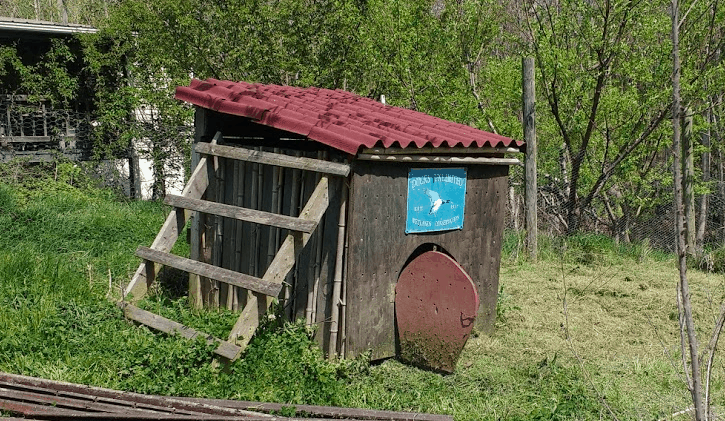
As you can tell from those nest suggestions, ducks really like deep nests that are enclosed except for the door. As long as you can create that kind of enclosed, tube-like feeling, any nest box you can imagine will be nice for your ducks.
Whichever design you choose though, you’ll want to make sure it is easy for you to collect eggs. You also want it to be easy to clean. Because ultimately, frequent egg collection and clean nesting materials are two simplest tricks to help keep duck eggs clean.
What to Do With Dirty Eggs?
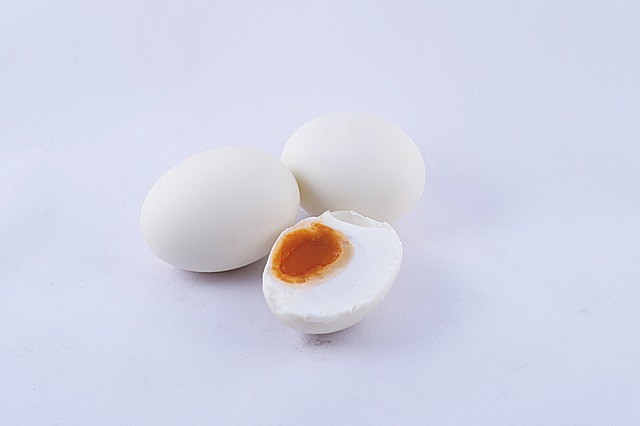
Even when you do all these things right, you may still have the occasional dirty egg. Personally, I fast-track eating those dirty eggs just so they don’t sit on my counter attracting flies.
Or, if I have an abundance of eggs already, cook them up and feed them back to the ducks as a treat. You can also wash them and store them in the fridge.
The key thing to note is that eggshells thins and airflow increases over time. This is why old eggs float and new eggs sink. So, the longer you store dirty eggs, the more likely it is that something not so wonderful will enter the pores of that eggshell.
Duck eggs are so delicious though. Keeping them around too long is probably not an issue on most homesteads!
